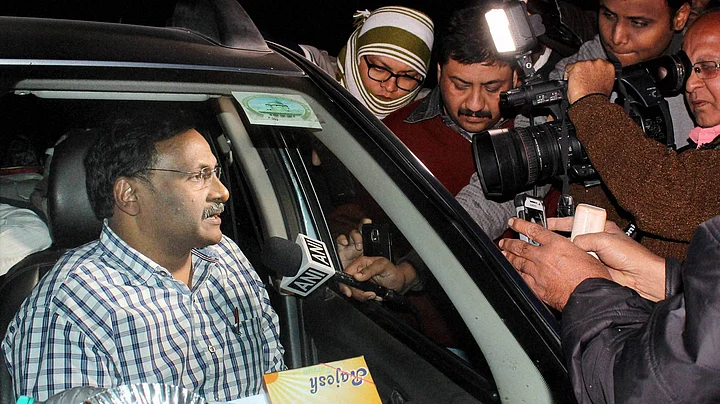Although there are no specific rules around urgent Saturday hearings at the Supreme Court, the top court’s decision to convene a special Saturday sitting, which led to a stay on Professor GN Saibaba’s release from jail in an alleged ‘maoist links’ case, is “unprecedented,” legal experts told The Quint.
"Never ever in the history of any country of the world has a special Saturday sitting been held to stay the acquittal of a person. This is unprecedented."Former Chief Justice of the Bombay and Rajasthan High Court Pradeep Nandrajog
While the power ultimately rests with the Chief Justice of India, there are broad guidelines under which courts operate to figure out which case warrants an “urgent” hearing on weekends, experts explained.
So, what are the parameters for urgent Saturday hearings? How frequently are they held? And was there a need for a Saturday hearing in Professor Saibaba’s case? Legal experts answer in conversation with The Quint.
First, a Recap of Events
Bombay High Court on Friday, 14 October, holds the entire trial against former DU professor GN Saibaba to be "null and void,” discharges him along with four co-accused and orders their immediate release
At approximately 4 pm on Friday, the Maharashtra government files an appeal challenging this order before the Supreme Court
Solicitor general Tushar Mehta states before a bench headed by Justice DY Chandrachud that he will move an application before the Supreme Court registry for obtaining administrative directions of the Chief Justice for listing the Special Leave Petition on Saturday
The matter is thereby listed for an urgent hearing before a special bench of Justices MR Shah and Bela Trivedi on Saturday morning
On Saturday, 15 October, the Supreme Court suspends the Bombay High Court judgment that had discharged Professor GN Saibaba
The bench of Justices MR Shah and Bela Trivedi also stay the release of Saibaba — who is 90% disabled — as well as that of his four co-accused in the matter
What are the Broad Guidelines for Convening Saturday Hearings?
Reiterating that there are no mandatory rules specific to an urgent hearing on a Saturday, Senior Advocate at The Supreme Court Sanjoy Ghose, however, told The Quint:
“According to past cases, such hearings are usually convened to stay situations like a death sentence or a demolition.”
Former Chief Justice of the Bombay and Rajasthan High Court Pradeep Nandrajog added that the following situations could warrant such hearings:
In case, somebody is fearing an arrest and wants the court to stay it
A death sentence has to be executed and needs to be stayed
In case eviction notices have been served and those subjected to it have challenged it
In instances of bulldozers reaching or about to reach a colony for demolition
“The simple litmus test is if the case is such that in the absence of an urgent hearing the status quo will be altered to an extent that the situation will become irreversible,” he added.
In fact, Chapter 7 of the Supreme Court rules hint at these broad parameters too.
“Provided that the court may sit on a Saturday, holiday or after court hours, to hear a matter under the orders of the Chief Justice the following cases shall be considered as causes of urgent nature:
Cases in which death penalty has been awarded
Petitions for habeas corpus and matters relating to it
Cases relating to imminent apprehension of demolition of property
Cases relating to dispossession or eviction
Cases relating to violation of human rights
Cases related to and of public importance
Cases seeking anticipatory bail and cases filed against order refusing/granting bail
The following category of cases shall not be treated as cases of urgent nature for listing during vacation or holidays:
Cases arising out of interlocutory orders
Cases relating to remand orders
Cases relating to pre-deposit of tax, penalty under specified statutes
Cases arising out of life sentence for more than one year
Service matters involving transfer and/revision, dismissal and removal from service
Transport matters, except those relating to cancellation of permits and requiring urgent interim orders and
Cases relating to decrees and their execution
"Notwithstanding anything contained hereinabove, the Chief Justice may, by a special or general order, constitute a bench of any composition and direct a particular case or a particular class or classes of cases to be listed before a particular bench,” the document suggests.
And How Frequently are Special Saturday Sittings Convened?
The last such Saturday sitting at the top court, Senior Advocate Sanjoy Ghose recounted, was in 2019 when the then Chief Justice of India Ranjan Gogoi heard a case involving sexual harrassment allegations levelled against himself by a former Supreme Court employee.
“Special Saturday hearings are very very infrequent. They happen once every 2-3 years,” Justice Nandrajog pointed out too.
'Why the Urgency?': Ex-Judges, Lawyers Decry Saturday Listing
Referring to the litmus test of ‘irreversible situations’ Justice Nandrajog pointed out that in GN Saibaba’s case, the test reveals that there was nothing irreversible about it.
“The man had no passport, the man couldn't flee, his physical condition was such that he couldn't have moved without being noticed, or gone into hiding. What was the urgency to list his case on a Saturday?”Justice Nandrajog
“It sets an extremely, extremely bad precedent and is absolutely unwarranted. If a lower court would have done what the Supreme Court did, the apex court would have come down very heavily on it,” he said.
“I don’t understand the tearing hurry with which the case was urgently listed on a Saturday. That man is 90 percent disabled and there is no way that he was going to run away. What was the need for this?” Supreme Court Advocate Paras Nath Singh questioned.
